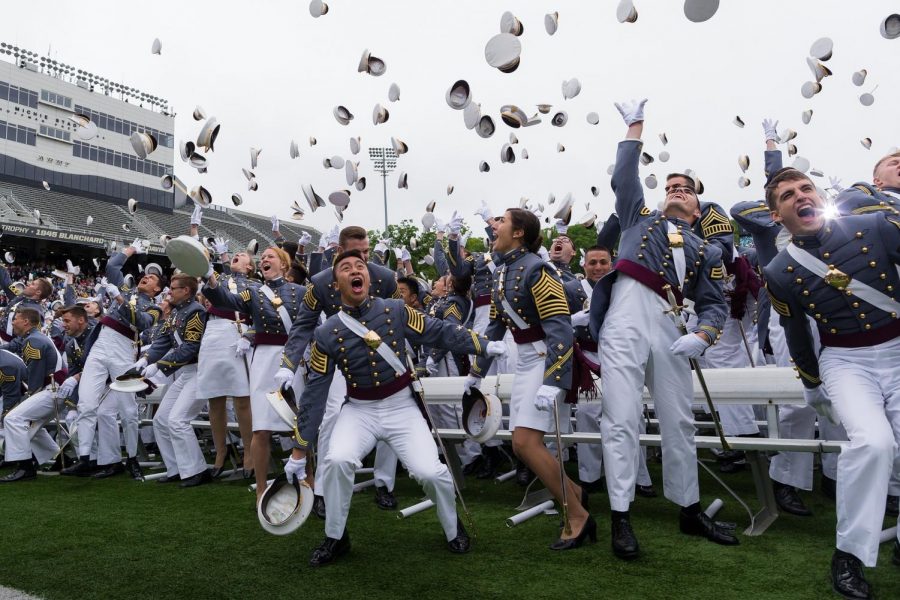Learning to Serve
A Profile of Students Applying to Military Academies and ROTC Programs
Graduates from the United States Military Academy at West Point celebrate their accomplishments with a ceremonial hat throw.
October 27, 2020
Few groups in the country make up about 1% or less of the population. In the United States, about 1% of our population comprises our nation’s military, and this 1% includes some of the most intelligent, athletic, courageous, and tenacious humans on the planet.
However, these people were not necessarily born with these gifts; they went through years of training, protocols, and education to be deemed worthy to serve in these elite forces.
For thousands, this training began at secondary universities with specifically designed programs built to prepare students for service. These schools, military academies and schools with ROTC programs, are widespread and immensely influential on those that serve in the military. Here at Salesianum, some members of the Class of 2021 here at Salesianum are currently going through the process of applying to these programs.
For Connor Girard ‘21, service has always been part of his life. “I’ve known I wanted to get into a military academy since freshman year,” said Girard. “The opportunity to serve my country, the prospective job opportunities beyond school, the fact that admission is free, and the structure and culture of the military academies were all reasons I wanted to apply.” Connor has decided to pursue answering this call to serve at either the Naval Academy, the Military Academy at West Point, the Coast Guard Academy, or the Air Force Academy. To do so, he had to complete a process that started his Freshman year.
“The process starts junior year which is really unique,” said Girard. “First, you fill out the free application form, then you need to get in contact with officers or liaisons. After that, you need a physical exam proctored by a government official. You need a letter of recommendation from a Congressperson or even the Vice President, and finally your application is ready to be reviewed.”
The application process is rigorous with multiple deadlines and commitments, but Girard believes serving his country is worth the extra steps and is proud he has been able to take this path..
Jack Ansley ‘21, is taking another approach to serving his country and attaining his college degree. Jack is looking to study engineering at schools like MIT, Georgia Tech, and Purdue while completing an ROTC program.
The difference between ROTC and a Military Academy lies within its course and setup with an ROTC program taking place at a regular four year college or university. “ROTC has mandatory classes split into Freshman/Sophomore classes and Junior/Senior classes that are made of leadership, physical fitness, and other military preparation classes,” said Ansley. “You would take these on top of your normal college courses, whereas at a military academy you’d be more focused on military preparation.”
For Ansley, the application process hasn’t been any different from a typical college application. “The application process for ROTC is the same as a normal application,” he says, “but it includes the added element of applying for an ROTC scholarship. You have to turn in your grades and tests scores like you would to a school, but you must also take a physical exam and interview with a local ROTC Detachment Officer.”
Although he isn’t quite sure where he’d like to go, Jack assures that he will be covered regardless what his choice of school is if he enters the ROTC. “If you are offered an ROTC scholarship, it’s not to any one school. You can apply for a scholarship to use at any school, your in-state school, or an $18,000 annual scholarship.”
Although these two programs have their differences, they ultimately serve the same goal for Jack and Connor; both Jack and Connor want to give back to their country while furthering their own education. They are excited for the possibilities that will come from the opportunities they are seeking, and we wish them and all Sallies students applying to military academies and ROTC programs luck as they pursue their goals of making a difference.

